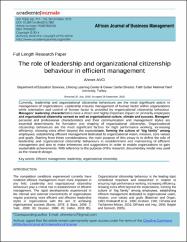The role of leadership and organizational citizenship behaviour in efficient management
Künye
AVCI, Ahmet. "The role of leadership and organizational citizenship behaviour in efficient management." African Journal of Business Management, 9.20 (2015): 717 - 724.Özet
Currently, leadership and organizational citizenship behaviours are the most significant actors in
management of organizations. Leadership ensures management of human factor within organizations
while orientation and control of human factor is provided by organizational citizenship behaviour.
Managers’ leadership characteristics have a direct and highly important impact on primarily employees
and organizational citizenship sensed as well as organizational culture, climate and success. Managers’
personal and professional characteristics and their communication and management styles are
essential determinants for formation and shaping of organizational citizenship. Organizational
citizenship behaviours are the most significant factors for high performance working, increasing
efficiency, showing extra effort beyond the expectations, forming the culture of “big family” among
employees, establishing efficient management dedicated to organizational vision, mission, core values
and goals. Starting from these considerations, the main purpose of this essay is to define the role of
leadership and organizational citizenship behaviours in establishment and maintaining of efficient
management and also to make inferences and suggestions in order to enable organizations to gain
sustainable achievements. With reference to the purpose of the research, documentary model was used
as the research design.
Kaynak
African Journal of Business ManagementBağlantı
http://www.academicjournals.org/journal/AJBM/article-full-text-pdf/662813E55767https://hdl.handle.net/11352/2325



















